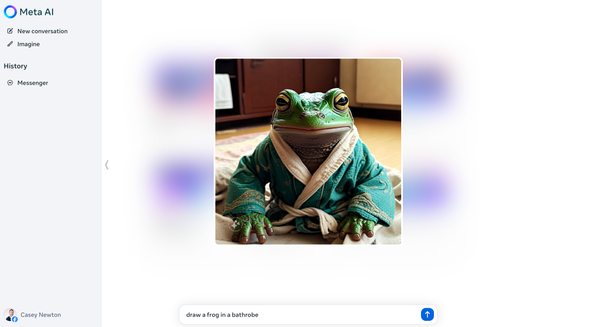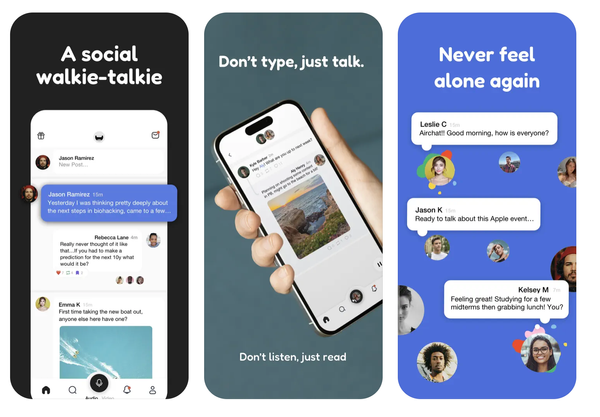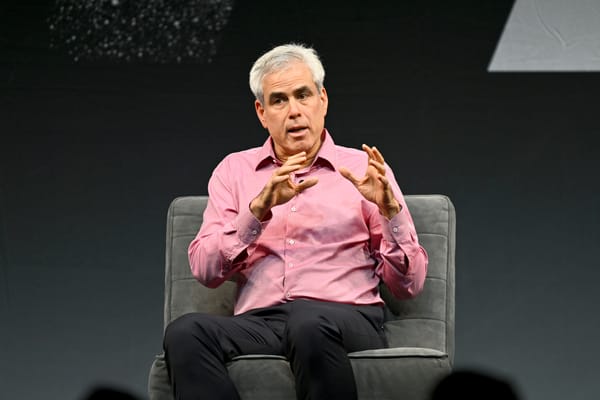Winners and losers in the race to add AI
ChatGPT is now running inside Snapchat, Notion, and other apps. Will it give them a sustaining advantage — or just line OpenAI's pockets?

Today, let’s talk about a subject that crosses my mind with every generative-AI startup pitch that lands in my inbox: who’s going to make the real money off artificial intelligence?
Last week the productivity startup Notion announced that Notion AI, a suite of tools based on OpenAI’s ChatGPT, had entered general availability. For $10 per user per month, Notion can now summarize meeting notes, generate lists of pros and cons, and draft emails.
Notion AI is among the first in a wave of companies that are racing to capitalize on growing interest in generative AI. This week Snapchat made available a ChatGPT-based chatbot called My AI for subscribers to its $4-a-month Snapchat Plus offering. The educational app Quizlet announced a ChatGPT-based tutor called Q-Chat. And Instacart said it is developing a tool that that will let customers ask about food and get ‘shoppable’ answers informed by product data from the company’s retail partners.”
What I’m interested in, as more and more companies adopt features like this, is where the ultimate value lies. Will an ever-growing number of companies find ways to integrate AI into products that are valuable enough to charge for — or will the bulk of the profits go to the small number of companies building and refining the underlying models on which those tools are based?
The answer will go a long way in determining whether generative AI represents a true platform shift on the order of the move from desktop computers to mobile phones, or a more limited set of innovations whose benefits accrue to a handful of big winners.
The subject is clearly on developer’s minds. This week, in response to concerns, OpenAI said it would no longer use developers’ data to improve its models without their permission. Instead, it would ask developers to opt in.
“One of our biggest focuses has been figuring out, how do we become super friendly to developers?” Greg Brockman, OpenAI’s president and chairman, told TechCrunch. “Our mission is to really build a platform that others are able to build businesses on top of.”
Maybe it’s that simple — developers don’t want to help OpenAI refine its models for free, and OpenAI has decided to respect their wishes. This explanation feels more consistent with a world where AI really does represent a platform shift.
Or maybe OpenAI believes that its models can continue to improve rapidly with or without all of those developers opting in. This explanation feels more consistent with a world in which OpenAI and a handful of others reap most of the rewards of AI.
So what kinds of AI features are people actually selling?
For the moment, AI products on the market are essentially just white-labeled versions of ChatGPT. As of this week, OpenAI is making it available to other companies through an API. For $0.002 for about 750 words of output, any company can resell ChatGPT in their own app.
For the moment, then, there’s not really much consumer choice when it comes to generative AI. To the extent that there are multiple options, it’s in interfaces. Do you want to draft an email using AI? It might be more convenient in Notion, where you already have some meeting notes. Do you want to get some recipe ideas or ask a quick trivia question? If you’re away from your laptop, it might be fastest to ask My AI on Snapchat.
For the moment, there are still billions of people who have never used ChatGPT. Introducing a re-skinned version of that service to a popular consumer app like Snapchat, which has 750 million monthly users, could help it find a whole new audience. Paying Notion or Snapchat for the feature also guarantees access to a service that has often gone offline amid heavy usage of its own web app.
At the same time, services like this are largely just making a bet against copy-paste. You can already get essentially everything here for free inside ChatGPT; apps like Notion and Snapchat are selling what feel like a fairly minor convenience for a significant premium.
The promise is that these tools will become more personalized over time, as individual apps refine the base models that they rent from OpenAI with data that we supply them. Every link that has ever been in Platformer is stored in a Notion database; what if I could simply ask research questions of the links I have stored there?
Those sorts of features are coming, Notion CEO Ivan Zhao told me in a recent interview. The initial set of writing and editing tools represent a “baby step,” he said. But much more profound changes are coming.
“I’ve never been this excited about something,” said Zhao, who is not prone to hyperbole. “It feels like electricity: the large language model is the electricity, and this is the first light-bulb use case. But there are many other appliances.”
Zhao told me that Notion would add lasting value to the language model by creating interfaces that are easier to use than rivals’. This is a more important project than it may first appear: one reason voice interfaces like Siri and Alexa have plateaued is that users struggle to remember all the different things they can be used for. (Another is that their language models aren’t nearly as sophisticated as ChatGPT’s.)
“This is as much an interface revolution as a technology revolution,” Zhao told me. “And we’re good at interfaces.”
There should also be real value in more personalized AI models. I’ve spent the past year or so writing a daily journal in an app called Mem, which offers its own set of ChatGPT-based features to premium subscribers. Eventually, I imagine I’ll be able to ask my journal all sorts of questions in natural language. What was I worried about last summer? When’s the last time I saw my friend Brian? A journal that gets good at that sort of thing could command a premium price, I think.
Still, there’s probably a limit to how many add-on AI subscriptions most people will want to pay for. Over time, the cost for these features seems likely to come down, and many of the services that cost $10 a month today may someday be offered for free.
But that, too, poses a risk for startups betting on features like these to drive growth. The cheaper the services get, the more likely they are to be offered for free by big platforms. What happens to Notion when its full suite of premium AI tools is offered for no cost within Google Docs?
The best-case scenario for these companies, I think, is that generative AI comes to resemble the cloud-computing market. The basic infrastructure will be built by a handful of companies, but the capabilities they make available cheaply inspires an entire new generation of startups.
At the same time, the capabilities of ChatGPT and other large language models are only going to expand — and I suspect they may gobble up a lot of today’s AI startups along the way. As they implement AI features into their apps this year, tech companies would do well to ask whether they might be building on top of a sinkhole.
What do you think? I’m curious where you think the ultimate value will accrue in the shift to generative AI. Please send me your best guesses, data, metaphors, analogies, and so on. If I get enough good stuff I’ll post an update next week.

On the podcast this week: David Yaffe-Bellany joins to catch us up about the legal case against Sam Bankman-Fried and the recent surge of enforcement actions against crypto companies. Plus: Kevin and I try out a most controversial TikTok filter … and it makes us look beautiful.
Hard Fork Live: I’m excited to announce that the first-ever live episode of Hard Fork will take place March 11 at the South By Southwest festival! We’ll be joined by Jonathan Kanter, who leads the antitrust division at the US Department of Justice. Please come say hi if you’re in Austin!
Apple | Spotify | Stitcher | Amazon | Google
Governing
- A US House panel approved a bill that would give President Biden the power to ban TikTok. It now moves to the Senate. (David Shepardson / Reuters)
- A growing number digital rights groups are speaking out against a potential US TikTok ban. (Cristiano Lima / Washington Post)
- The Biden administration’s national cybersecurity strategy seeks to expose tech companies to liability for security flaws in their products, as the government moves toward stricter regulation. (Christian Vasquez and Elias Groll / CyberScoop)
- Two Democratic Senators sent a letter to Meta urging it to stop its plan to release the Horizon Worlds metaverse app to teens ages 13 to 17. (Salvador Rodriguez / Wall Street Journal)
- The FDA rejected Elon Musk’s bid to test Neuralink’s brain implants in humans, citing safety risks. (Rachael Levy and Marisa Taylor / Reuters)
- The UK’s Online Safety Bill has turned into a bitter fight over Britain’s approach to digital regulation that’s left few people satisfied. (Mark Scott and Annabelle Dickson / Politico)
- Microsoft's offer of licensing deals to rivals will likely address EU antitrust concerns over its $69 billion acquisition of Activision Blizzard. (Foo Yun Chee / Reuters)
- Kremlin agents are using Facebook ads in an effort to destabilize the democratic government of Moldova. (Morgan Meaker / Wired)
- Twitter updated its “violent speech” policy to prohibit users from expressing “wishes of harm.” (Karissa Bell / Engadget)
- A parliamentary committee in Canada is calling in top Google executives after the company began testing ways to block news content from searches if Parliament passes the Online News Act. (Peter Zimonjic / CBC)
Industry
- TikTok is in talks with Apple and Google to ensure its plans to overcome privacy and security concerns don’t get derailed by their app store rules. (Juro Osawa / The Information)
- TikTok is imposing a 60-minute time limit for users under 18. It can be circumvented rather easily, though. (Alex Barinka / Bloomberg)
- TikTok earned $205 million more than Facebook, Twitter, Snap, and Instagram combined on in-app purchases in 2023. (John Koetsier / Forbes)
- Neal Mohan, the new head of YouTube, wrote a blog post detailing the company’s 2023 priorities and said YouTube is developing generative AI tools for creators. (Jess Weatherbed / The Verge)
- Meta plans to release its first pair of smart glasses with a display in 2025 alongside a neural interface smartwatch designed to control them. (Alex Heath / The Verge)
- Emily M. Bender, a computational linguist at the University of Washington, warns against generative AI tools that are designed to sound human. (Elizabeth Weil / New York Magazine)
- Elon Musk is flying more on his private jet than almost any US billionaire, and the frequency has ramped up since he acquired Twitter. (Marie Patino, Leonardo Nicoletti and Sophie Alexander / Bloomberg)
- Elon Musk’s decision to pull the plug on third-party Twitter clients has put them in a position to not only lose future revenue but also to have to pay back months’ worth of income. (John Gruber / Daring Fireball)
- Twitter experienced an outage Wednesday morning, with the Following and For You timelines not loading for some users. (James Vincent / The Verge)
- Twitter was the go-to platform during natural disasters and moments of crisis to help responders communicate and react quickly, but that’s changing under Elon Musk. (Juliette Kayyem / The Atlantic)
- Bluesky, the Twitter alternative backed by Jack Dorsey, has hit the App Store and is available in an invite-only beta. (Sarah Perez / TechCrunch)
- Twitch streamer Kai Cenat broke the record for most subscriptions on the service at 300,000. (Cecilia D'Anastasio / Bloomberg)
- Snapchat will now allow users to pause their Snap streaks — for a price. (Ivan Mehta / TechCrunch)
Those good tweets
For more good tweets every day, follow Casey’s Instagram stories.
opening every single shared document i have access to at my job, highlighting the entire document without looking at it, commenting “?”, and immediately going on vacation
— Jon Bois (@jon_bois) 9:13 PM ∙ Feb 22, 2023
texans are so scary bc they have a very mild accent so you think they're normal and let your guard down and then you offer them an orange and they say "i've never eaten fruit"
— gale na (@poisonjr) 6:36 PM ∙ Feb 28, 2023
we wiped out Subway’s natural predator (Quiznos) and now the population has grown out of control
— Vinny Thomas (@vinn_ayy) 3:54 PM ∙ Mar 1, 2023
— wild TikTok screenshots (@wildtiktokss) 6:32 PM ∙ Feb 28, 2023
Talk to us
Send us tips, comments, questions, and AI use cases: casey@platformer.news and zoe@platformer.news.





